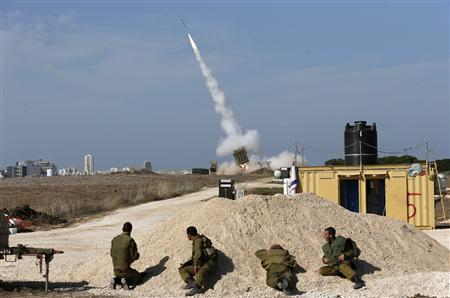The Iron Dome's New Brother: David's Sling Joins Israel's Growing Anti-Missile Family

Israel's Iron Dome, the extraordinarily expensive and surprisingly effective anti-missile search-and-destroy defense system, now has a companion in the skies. On Nov. 20, the first installation of David's Sling (also known as the Magic Wand) made its presence known to the world when it successfully intercepted its first missile. The test will allow for continued development of the new defense system, Israel Defense reported.
The Iron Dome intercepted an estimated 421 of the more than 1,000 rockets launched from Gaza in the recent eight-day war. The Iron Dome system is really designed to intercept only short-range missiles, and not at the constant rate at which rockets were flying in during that conflict. In addition, each missile in an Iron Dome battery costs between $50,000 and $100,000, and are usually fired in pairs, United Press International reported.
David's Sling is supposed to rectify both of these problems, by being both more cost-effective and able to intercept longer-range missiles, potentially fired from up to 300 kilometers (190 miles) away, Al-Jazeera reported.
“As a concept, we’re not developing a system only for this [anti-rocket, anti-missile] mission. We’re trying as much as we can to develop a multi-role air defense system that later on could be integrated on ground or naval platforms,” an anonymous official told Israel Defense.
The system isn't expected to be fully operational until 2014, the Jewish Telegraph Agency reported, but in the meantime, the Obama administration has pledged $3.1 billion to Israel for its military programs in the 2013 fiscal year, despite the possible $600 billion in cuts to U.S. defense spending over a decade that would take effect if no deal on the so-called fiscal cliff is reached by January 1.
David's Sling was a project developed by Israel's Rafael Advanced Defence Systems and the U.S. company Raytheon (NYSE:RTN), which also designed the Patriot missile system first used by Israel in 1991 during the Persian Gulf War.
Israel also has the Arrow 2 system, designed to intercept long-range ballistic missiles, the next generation of which is scheduled to be deployed in 2016, Russia Today reported.
© Copyright IBTimes 2024. All rights reserved.






















